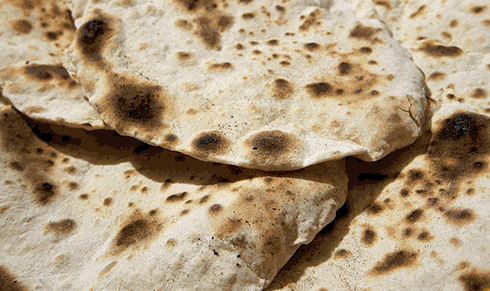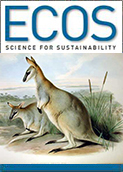
|
Published: 23 June 2014
Wheat strains that will help keep food on the table
Indian and Australian scientists are collaborating to develop new wheat varieties that are resistant to devastating rust diseases and use water more efficiently.

|
|
Wheat flour-based chapatis are a staple in India. Credit:
[dac~] CC-BY 2.0
|
The researchers are also on the lookout for improved grain-processing qualities for products like bread and Indian chapatis.
‘One of the characteristics showing promise for improving water-use efficiency is high vigour, where young seedlings grow quickly to produce a leaf canopy that shades the earth, slowing down soil evaporation and weed growth,’ says Dr Eric Huttner, manager of the Australian Centre for International Agricultural Research’s (ACIAR's) crop improvement and management program.
‘Plants producing long coleoptiles (the protective sheath covering the emerging shoot) offer potential for seeds to be planted deeper in the ground, where they can access deeper soil moisture.’
Genetic sources of deep-rooted wheat have also been identified, again providing new potential for tapping into deeper soil moisture and producing more stable and secure crops.
Dr Swapan Kumar Datta, Deputy Director General (Crop Science) at the Indian Council of Agricultural Research (ICAR), said the joint research program has made significant contributions to built-in plant protection by using marker assisted selection with rust resistance genes combining with yield improvement.
‘I am confident the program will address the sustainable and durable rust resistance along with quality and yield improvement, which will benefit Australia and India and the global wheat-improvement program. Importantly, farmers will benefit the most,’ said Dr Datta.
The program has been led by the University of Sydney, CSIRO and the Indian Directorate of Wheat Research since 2007, and co-funded by the ACIAR and ICAR. A recent workshop in Karnal, India, brought together about 70 wheat scientists from both countries to share ideas on how to build on the program’s successes.
The program has also helped build the careers of young scientists such as Rikita Chowdhary, who was awarded an ACIAR John Allwright Fellowship in 2013 for a PhD project between the University of Sydney and CSIRO Plant Industry in Canberra.
Ms Chowdhary says her research on earlier sowing of wheat in India to increase water-use efficiency and yield has provided an opportunity to work with renowned wheat root specialists at CSIRO.
‘Most importantly, I have learned about the value of my research which is important for farmers' fields, not only for India or Australia,’ she says.
‘It will help all those wheat-growing parts of the world, mainly those facing heat stress and water limitations at important stages of the wheat life cycle from germination to grain yield.
Source: ACIAR



